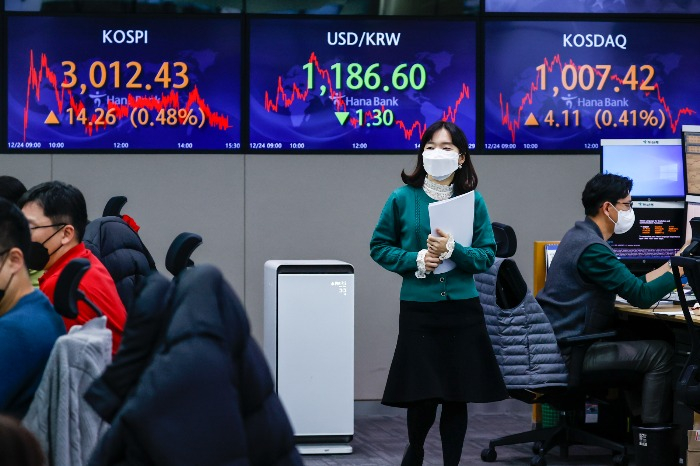Foreigners sell net $22 bn main Kospi shares in 2021
Chinese tech firms regulations and worries over the chipmaking sector fueled foreigners' largest exit since 2008
By Dec 26, 2021 (Gmt+09:00)
LG Chem to sell water filter business to Glenwood PE for $692 million


Kyobo Life poised to buy Japan’s SBI Group-owned savings bank


KT&G eyes overseas M&A after rejecting activist fund's offer


StockX in merger talks with Naver’s online reseller Kream


Mirae Asset to be named Korea Post’s core real estate fund operator



Foreigners sold a net 25.9 trillion won ($21.8 billion) worth of South Korean stocks on the main Kospi from Jan. 1 to Dec. 23 of this year, marking foreigners' largest annual net sales of the Korean stakes since 33.6 trillion won in 2008, according to the Korea Exchange (KRX) on Dec. 24. Market watchers say that concerns over the slowdown of Korea’s major manufacturing sectors, such as semiconductors, and woes over the Chinese economy's hard landing have prompted foreigners’ selling spree of Korean stocks.
Foreigners’ shareholding ratio dropped from 36.5% as of end-2020 to 33.6% as of the end-2021, a record low after 32.2% as of end-2015. Affected by foreign investors’ Korean stock sales, the Kospi has risen only 4.34% this year, compared to the 25.83% rise of the S&P 500, 21.82% of Taiwan’s Taiex, 4.9% of China’s SSE Composite Index and 4.93% of Japan’s Nikkei.
Foreign investors added a net $28.6 billion and $30.7 billion to the Japanese and the Chinese stock markets this year, respectively. On the contrary, foreigners dumped a net $23.5 billion of Korean shares in 2021, more than their $17.7 billion unloading of Taiwanese shares, KRX said.
Woes over a downturn in the Korean chipmaking industry accelerated foreigners’ Korean stock selling spree. This year, foreign investors sold 24.7 trillion worth of stakes in Kospi-listed electrical and electronic businesses. This accounts for 95.2% of their entire sales of 25.9 trillion won.
'FOREIGNERS WON'T COME BACK'
The crisis involving Chinese real estate developer Evergrande Group and concerns over China’s sharp growth slowdown also contributed to the selling of Korean shares. “Foreign investors tend to combine the Chinese and Korean markets when rebalancing their investment portfolio”, said Jeong Myung-ji, an analyst at Samsung Securities Co.
In the meantime, domestic retail investors bought 66.8 trillion won worth of Kospi stocks this year, up 41% from 47.5 trillion won last year and their largest purchases ever. As the Korean investors' buying spree weakened in the second half of this year, the market's focus has moved to foreigners’ comeback to the Korean stock market.
However, experts say foreign investors will not likely return to buy Korean shares. “They will keep selling Korean stocks in 2022 due to the hawkish Federal Reserve-led stronger dollar and Korean listed corporates’ performance anxiety,” said Daishin Securities Co.’s analyst Lee Kyung-min. On the other hand, some analysts say foreigners may come back to purchase Korean stocks thanks to China’s new fiscal stimulus and global disinflation next year.
IMPACT BY CHINESE ECONOMY AND CHIPS
Foreign investors started selling Korean shares in earnest in May when the Fed signaled tapering measures. In June, China’s regulation of its tech companies, including NYSE-listed ride-hailing app Didi Chuxing, fueled foreigners’ exit from Morgan Stanley Capital International (MSCI) emerging markets. China makes up around 35% of MSCI’s Emerging Markets Index while Korea accounts for 13%.
Concerns over China’s stagflation have also accelerated foreigners’ Korean stock selling. China is the biggest importer of Korea, making up 25% of Korea’s entire exports. “When foreigners dumped Chinese stocks, they sold Korean stocks as well, particularly semiconductor shares of which they have a high proportion in their portfolios,” said Jung Yong-taek, head of research at IBK Investment & Securities Co. of Korea.
Foreigners’ selling of Korean semiconductor shares pulled down the stock market as the industry makes up 25% of Korea's market capitalization. In its August report, Memory – Winter is Coming, Morgan Stanley downgraded SK Hynix Inc.'s share price from 156,000 won to 80,000 won and Samsung Electronics' shares from 98,000 won to 89,000 won, as well as forecast a supply glut in the memory sector.
Despite the record-high performances of some Korean conglomerates including Samsung Electronics Co., Hyundai Motor Group and POSCO this year, many foreign investors left the Korean stock market due to earnings peak-out worries. Kospi-listed corporates’ operating profit growth rate was 131.7% in the first quarter and declined to 108% and 50.1% in the second and third quarters, respectively.
Foreign investors returned to the Kospi late in the year, buying a net 2.6 trillion won and 3 trillion won worth of stakes in November and December, respectively. Yet, foreign shareholders’ proportion in the Kospi declined from 36.5% in early-2021 to 33.6% as of December.
Foreigners are not likely to return as big buyers in Korean stocks in the early part of 2022, market speculators say.
Write to Seul-gi Lee and Shim Sung-mi at surugi@hankyung.com
-

-
 MarketsForeigners buy Kospi futures to raise bullish bets on Korea stocks
MarketsForeigners buy Kospi futures to raise bullish bets on Korea stocksDec 09, 2021 (Gmt+09:00)
2 Min read -
 MarketsKospi lowest in nearly 7 months; outlook dim on inflation, US debt standoff
MarketsKospi lowest in nearly 7 months; outlook dim on inflation, US debt standoffOct 05, 2021 (Gmt+09:00)
4 Min read -
 MarketsKorea stocks, won tumble as foreigners dump $1 bn in equity futures
MarketsKorea stocks, won tumble as foreigners dump $1 bn in equity futuresSep 28, 2021 (Gmt+09:00)
2 Min read -

-
 MarketsKorean won at 11-month low as foreigners dump $6.1 bn in stocks this week
MarketsKorean won at 11-month low as foreigners dump $6.1 bn in stocks this weekAug 13, 2021 (Gmt+09:00)
1 Min read -
 Stock marketSamsung returns as foreigners’ top pick; Kospi just shy of record high
Stock marketSamsung returns as foreigners’ top pick; Kospi just shy of record highJun 03, 2021 (Gmt+09:00)
3 Min read


